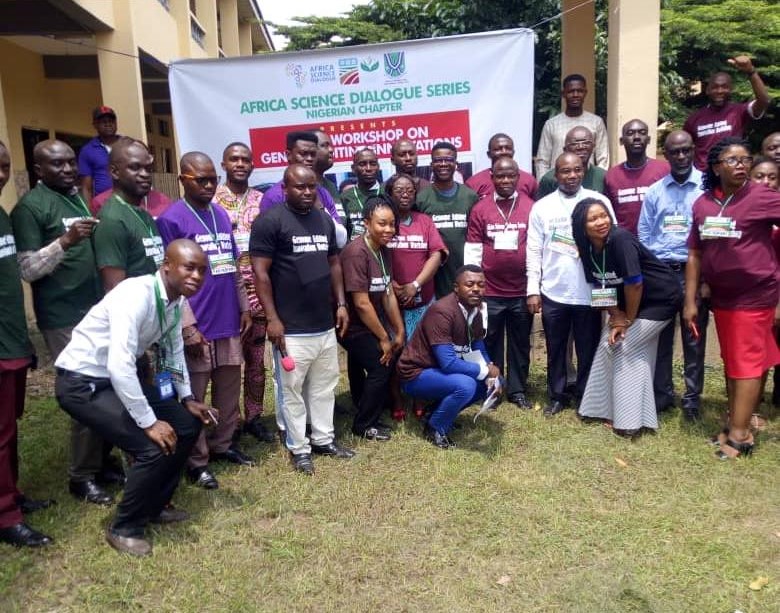
Nigeria Moots for a Multidisciplinary Approach to Genome Editing
September 15, 2021| |
Biotech stakeholders in Nigeria have challenged local experts to forge stronger ties and collaborations in accelerating genome-editing research whose results carry enormous prospects to solve regional problems.
In a joint communique, the stakeholders affirmed the benefits of genome editing in transforming health, enhancing the environment, and improving food security and nutrition in Nigeria and the region. The communique, signed and adopted by 17 biotechnologists, has proposed a raft of measures aimed at facilitating efficient acceptance and utilization of this technology and its products.
The biotechnologists are calling on the Federal Government of Nigeria to sustain research through funding and grants channeled towards genome editing to solve specialized problems through propagation of products and services that are beneficial to its citizens. "There is a need to convince the government to provide funds for research. If the Tetfund could afford to sponsor a student with 50 million naira, why not use the money to equip a functional laboratory where the student could be trained locally, rather than spending the money outside the country?" they wondered.
The stakeholders advised that to ensure acceptability of gene-edited products, good communication of research findings is important to keep pace with the rapid advancements in science and technology. "This will also encourage trust and increase knowledge sharing and understanding, leading to public acceptance and reduce negative opinions just about anything 'gene'. Good communication skills were accepted to influence stakeholders' complexity and help in conflict resolution on issues surrounding the technology," read the communique.
Researchers have also been asked to be more practical in transmitting scientific information to the public. "Research groups should be formed on issues peculiar to our environment such as tilapia, yam, or other crops and livestock, get their genes sequenced, and continue with basic research that would cumulate to gene editing in the organism for various applications in agriculture, medicine, environment and industry," said the stakeholders. A clarion call was made for the need to break the "silos" mentality and enhance dialogues among associated and pertinent faculties in the universities including social sciences and mass communications.
The communique was discussed and adopted during a daylong workshop on genome editing innovations held at the College of Agricultural Sciences Campus in Ebonyi State University on September 8, 2021. It emerged during the workshop that Nigeria has the capacity to take lead in driving genome editing research on the continent since it is endowed with specialized laboratories. The National Root Crops Research Institute in Umudike, Ahmadu Bello University in Zaria and the University of Calabar among several other research institutions have well-equipped laboratories that can effectively support this new technology. Additionally, the county's biosafety system is robust and effective thus can efficiently regulate any new technology within its mandate including genome editing in line with global best practices.
A Nigeria chapter of the Africa Coalition on Communicating about Genome Editing was initiated under the Africa Science Dialogue Series. The workshop was co-organized in partnership with ISAAA AfriCenter, Program for Biosafety Systems, and Ebonyi State University, among other partners.
For the full workshop communique contact: Prof. Benjamin E. Ubi, Dept. of Biotechnology, Ebonyi State University/Coordinator, Africa Science Dialogue Series – Nigerian Chapter at ubi.benjamin1@yahoo.com.
| |
Biotech Updates is a weekly newsletter of ISAAA, a not-for-profit organization. It is distributed for free to over 22,000 subscribers worldwide to inform them about the key developments in biosciences, especially in biotechnology. Your support will help us in our mission to feed the world with knowledge. You can help by donating as little as $10.
-
See more articles:
-
News from Around the World
- Researchers Sequence Shea Tree Genome to Support Breeding, Conservation Efforts
- Asian Regional Workshop on Current and Upcoming Items under the CBD and its Protocols
- Genetically Engineered Soybeans Produce Cow-less Cheese
- Label Information Increases Purchase Appeal of GM Foods -Study
- Study Shows Filipino Biotech and Organic Farmers Open to Co-Existence
- Filipino Scientist Identifies Gene to Help Rice Plants Survive Drought
-
Research Highlights
- Researchers Develop Astaxanthin-rich Maize
-
Plant
- Scientists Use CRISPR to Target Disease Spread from Mosquitoes
- BLB-resistant Vietnamese Rice Developed Using CRISPR-Cas9
- Researchers to Use Gene-editing Technology to Incite Crop Regeneration
- MIT Experts Find Programmable Gene Editing Proteins outside of CRISPR Systems
- Nigeria Moots for a Multidisciplinary Approach to Genome Editing
-
Read the latest: - Biotech Updates (February 18, 2026)
- Gene Editing Supplement (January 28, 2026)
- Gene Drive Supplement (February 22, 2023)
-
Subscribe to BU: - Share
- Tweet

